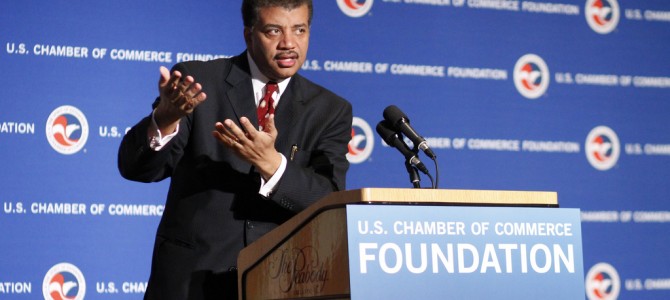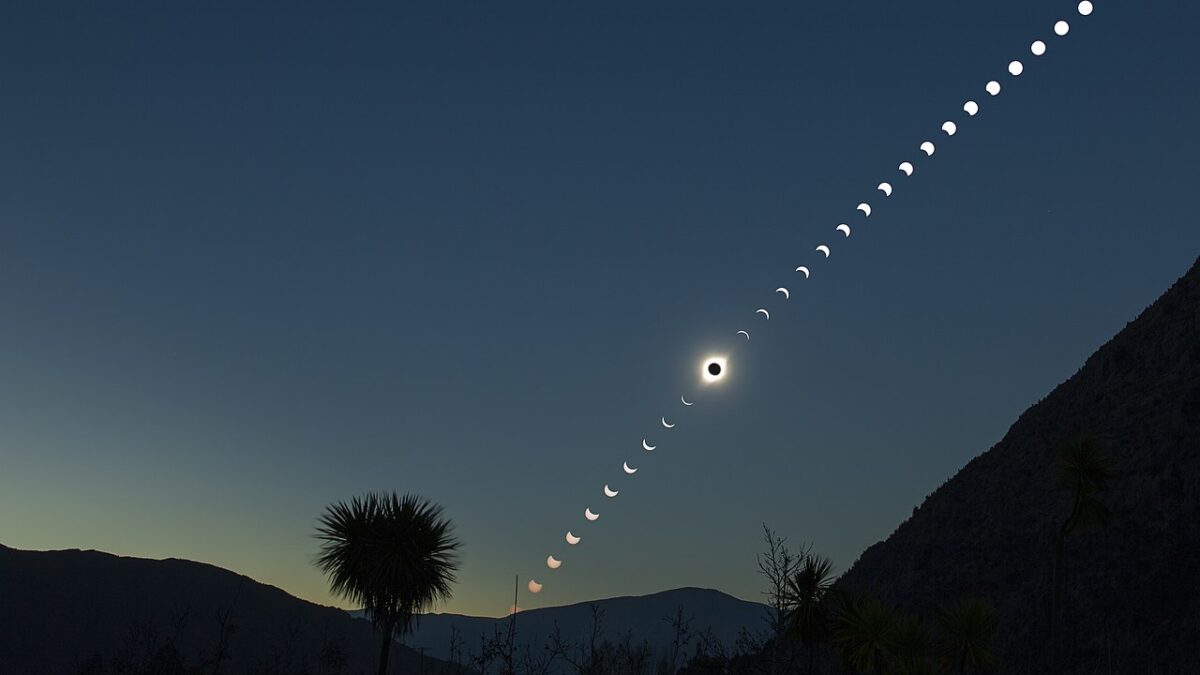
The Neil deGrasse Tyson kerfuffle has reached a conclusion of sorts.
To recap, The Federalist‘s Sean Davis has done some good old-fashioned, dogged reporting and tracked down a list of dubious examples commonly used by science popularizer Neil deGrasse Tyson, the unvarying effect of which is to make Tyson and his listeners feels smart and to make everyone else—including physicians as a profession—look stupid.
The example that stuck the most was Tyson’s spurious quotation of a post-9/11 George W. Bush boasting that God named the stars, implying the Judeo-Christian God’s superiority over the Muslim God. Or that would have been the point, if Bush had ever said it.
This example stuck for a number of reasons. First, the presidency is so thoroughly documented, with so many witnesses to what the president did or did not say, that the claim is relatively easy to check. (That’s as opposed to other anecdotes that Tyson claims are from private conversations.) Second, the version quoted by Tyson clashes so clearly with what everyone who covered Bush remembers about his presidency, which is that after 9/11 he was all about sending warm fuzzies to the religion of peace. There were some of us who thought he went a too far in that regard, but it reflected a general tendency in his presidency to avoid religiously divisive language, which I hope we can all agree is a good thing in a president.
Third, it was telling because it represented a definite partisan angle. It was the left that really worked itself up into a lather over the idea that Bush was an advocate of “theocracy” (there was a whole website devoted to it) or that the wars we fought in the Middle East were a deliberate attack on Islam. This is the perspective from which someone would find it believable and relevant to remember Bush boasting about the superiority of the Christian deity over the Muslim version.
But the controversy all appears to be ambling toward a resolution. After posting an odd kind of non-denial denial on Facebook over the weekend, Tyson was issued a direct challenge on Twitter from neuroscientist and science writer Christopher Chabris:
Why not say “My apologies to George W. Bush for repeatedly & completely misstating what he meant in that quote about ‘our God.'”
Tyson responded: “Thanks. Sure, I plan to say something like that soon. I’m looking for a good medium & occasion.”
@cfchabris Thanks. Sure, I plan to say something like that soon. I’m looking for a good medium & occasion.
— Neil deGrasse Tyson (@neiltyson) September 28, 2014
I don’t think there’s any real logical difference between promising you’re going to apologize in the future and actually apologizing now. Both concede the point. The only difference is that actually apologizing now is an order of magnitude classier.
Be that as it may, it’s a happy conclusion—or will be, presumably whenever Tyson finds a time and venue—and George W. Bush, wherever he might be, can rest easy that his name has been cleared.
Except that was never really the issue. Tyson’s concession is better late than never, to be sure, but the issue is how long it took to get even a promise of a future admission on this issue—and not just from Tyson himself, but from his legions of supporters. That he misquoted Bush is not so important. People misquote other people all the time. What is important is Tyson’s initial dismissive attitude and his online supporters’ refusal to admit that the great man could make an error.
So we were treated to a host of rationalizations from Tyson’s supporters. We saw media types whose professional responsibilities presumably include verifying quotations from public figures, who threw up their hands and declared that in this case, accuracy didn’t matter. Then there was the deletion of any mention of the controversy on Wikipedia, followed by a retaliatory attempt to scrub the very existence of The Federalist from the online encyclopedia.
All of that led up to Tyson’s own weird Facebook post, which shows a pretty thorough unfamiliarity with the pitfalls of various logical fallacies.
For example, in responding to a polite, factual e-mail from Sean Davis, Tyson makes a big deal about people calling him a “liar” or “idiot” in online discussions, a horribly scarring event which happens to everyone on the Internet about five times a day. But Sean never did that, so why mention it? It’s a classic case of Poisoning the Well—pre-emptively discrediting Sean by associating him with anonymous disreputable Internet commenters.
Or there is Tyson’s insistence that maybe the Bush quote he misremembered still might be out there somewhere, because “One of our mantras in science is that the absence of evidence is not the same as evidence of absence.” But another principle of science is that the burden of proof is on he who asserts the positive. If I say there are aliens on Mars, I can’t just say, hey, absence of evidence is not evidence of absence, so maybe they’re really there. I’ve got to find the damn aliens.
That’s a pretty good analogy, actually, because the Bush presidency has been explored and documented much more thoroughly than the surface of Mars.
Then there is the fact that Tyson seems to have finally conceded the point when some of his supporters dug up a different speech from Bush in which he did use a quote about God naming the stars, but in a very different context with a very different meaning. But this quote wasn’t suddenly discovered by Tyson’s apologists. It was mentioned in Sean Davis’s original article as the probable, misremembered source of the quote. To then “discover” it later indicates that Tyson is responding to a criticism he hasn’t bothered to read.
So why does all this circling of the wagons matter? It matters because these are the same people claiming special credibility, as self-appointed tribunes of science, on issues that are much, much larger. No, Tyson misquoting Bush does not directly imply that global warming isn’t happening. (And no, John Aziz, no one ever claimed that it did.) But when the whole public case for global warming is based on a supposed consensus among climate scientists, whose judgment we are supposed to trust, then we need to know: could these scientists and their public advocates actually admit it if they were wrong? If some new evidence—say, increasing Antarctic ice, or a 17-year plateau in surface temperatures—contradicted their theory, how eager would they be to own up to it?
In that context, it is precisely the relative unimportance of the Tyson examples that makes them so worrying. If a correction has to be pulled out so unwillingly on such a small issue, and if so many people are willing to tolerate a little factual inaccuracy so long as they agree with the overall narrative, that only gives you a flavor for how unwilling they are to budge on the bigger issues.
I mention global warming as an example, but it’s broader than that. Cass Sunstein has popularized the idea of regulatory “nudging,” all based on the presumption that cognitive scientists and academic elites know better how we should run our lives. Left to our own devices, we will mess up most of our decisions, so they have to manipulate our “choice architecture” to steer us in the right direction.
They’re all convinced that we poor souls suffer from “cognitive bias” that clouds our thinking—Confirmation Bias, say, or In-Group Bias—but they are free from such biases. Call this Cognitive Bias Bias. That’s why the perfect quote from Tyson is this passage from his weekend Facebook post.
“FYI: There are two kinds of failures of memory. One is remembering that which has never happened and the other is forgetting that which did. In my case, from life experience, I’m vastly more likely to forget an incident than to remember an incident that never happened. So I assure you, the quote is there somewhere. When you find it, tell me.”
Eyewitness testimony is notoriously unreliable, and so are vague recollections. There is no need to consult cognitive scientists about this, it’s common sense. How many of us have watched a movie a second time and realized that, darn it, he doesn’t really say, “Play it again, Sam.” But the hubris here can’t be matched: other people might have unreliable memories and have to actually Google a quote to make sure they get it right before using it—but not me, my memory is always accurate.
This is all summed up in a classic Neil deGrasse Tyson aphorism which, judging from his Twitter feed, is extremely popular: “If your belief system is not founded in an objective reality, you should not be making decisions that affect other people.”
When you really think about this, the upshot is that no one who is religious is entitled to make decisions, not even about his own life—after all, what decision does not, in some small way, “affect other people”? By contrast, those who agree with Tyson assure themselves that because their belief system is “based on objective fact,” they are entitled to make decisions for other people, such as reorganizing the entire health-care system or dismantling the global economy to stop global warming.
All of which inspired me to tweet in response: “What if your belief that your belief system is based on an objective reality is not based on an objective reality?”
@neiltyson What if your belief that your belief system is based on an objective reality is not based on an objective reality?
— Robert Tracinski (@Tracinski) September 20, 2014
In this case, Tyson held a belief that was not founded in an objective reality. And it took a revealingly long time to get anyone to acknowledge that.
Follow Robert on Twitter.








